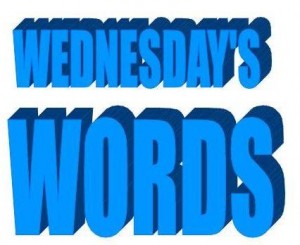Wednesday’s Words: Dialogue Envy
 Books on how to write dialogue often suggest we listen to people talk. Sounds like good advice, but have you ever truly listened? “We . . . um . . . we, like . . . you know . . . we stammer and like we repeat ourselves and um . . . you know.”
Books on how to write dialogue often suggest we listen to people talk. Sounds like good advice, but have you ever truly listened? “We . . . um . . . we, like . . . you know . . . we stammer and like we repeat ourselves and um . . . you know.”
Even when we speak coherently, we don’t converse. We lecture. We tell long, boring, convoluted stories. We interrupt others and talk over them. We use clichés. We tell jokes that take forever to get to the punch line. None of which helps us write dialogue. If characters in books talked the way we talk in real life, who would bother reading? We want our characters to sound like us, just not talk like us. We also want their conversations to be witty, to the point, and conflicted.
Many authors seem to think bickering is a way of showing that conflict, or maybe they think it is witty and to the point, but it isn’t. At least not for me. I find it distracting, especially if the two bickerers are supposed to be a romantic couple. The more they insult each other, the less it seems like foreplay and the more it seems like plain old-fashioned meanness.
Last night I watched But Not for Me, a romantic comedy written by Rob Lipton, starring Clark Gable, Lilli Palmer, and Lee J. Cobb. And I got dialogue envy. Every word those three spoke shimmered brightly. When the romantic couple got together at the end, even though they’d been in conflict during the entire movie, I could believe they were in love.
Watching the movie, I discovered a few things about Lipton’s writing. He did not write dialogue that rambled, going nowhere. He did not write dialogue that distracted from the story; it was the story. And he most assuredly did not write dull dialogue.
Now if only I could figure out what he did write, rather than what he did not!



Hi Pat. When we read dialogue by an effective writer, it just flows on the page and we get drawn in. That struck me today as I was reading an excerpt from author Deborah Coonts on Sia’s Over Coffee blog. The prose was clean and the characters had plenty of energy. Yes, that’s the way it should be.
You’re definitely right, Pat. I love good dialogue, but good dialogue doesn’t mirror real conversation. It’s not just the lack of ums and uhs. It’s also length. A tight, coherent real-world conversation would seem long and boring in a novel. If I recall correctly, Jim Gunn suggested that novel dialogue needed to be roughly one-fourth to one-fifth the length of real-life conversation in order to have the same impact.